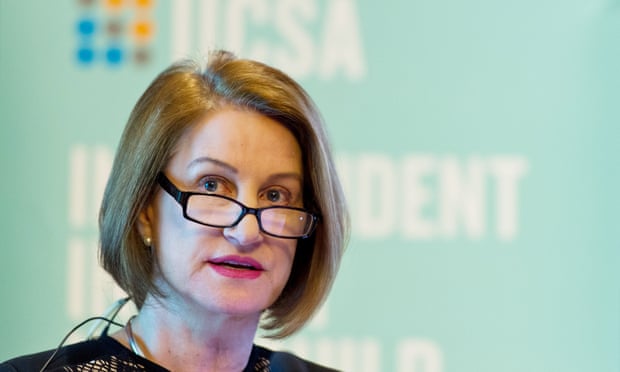Almost three years ago I was asked by Durham constabulary to advise on detention centre regimes as background to an investigation of allegations of abuse at HM detention centre Medomsley. Its work was later taken over by the independent inquiry into child sexual abuse. Now we learn (Victims threatening boycott of child abuse inquiry, 9 September) that the inquiry’s terms of reference preclude them from hearing evidence from those who were 18 or over at the time, though it will consider behaviour commencing before the age of 18.
Until 1970 the age of majority in the UK was set at 21. Medomsley was classified as a senior detention centre and thus held those between the ages of 17 and 21, all of them children as the law then stood. Medomsley opened in 1961, so the inquiry’s terms of reference will preclude about nine years’ worth of serious allegations, except for those made by a few former trainees at the very lowest end of the age scale.
Almost three years ago I was asked by Durham constabulary to advise
on detention centre regimes as background to an investigation of
allegations of abuse at HM detention centre Medomsley. Its work was
later taken over by the independent inquiry into child sexual abuse. Now we learn (Victims threatening boycott of child abuse inquiry,
9 September) that the inquiry’s terms of reference preclude them from
hearing evidence from those who were 18 or over at the time, though it
will consider behaviour commencing before the age of 18.
Until 1970 the age of majority in the UK was set at 21. Medomsley was classified as a senior detention centre and thus held those between the ages of 17 and 21, all of them children as the law then stood. Medomsley opened in 1961, so the inquiry’s terms of reference will preclude about nine years’ worth of serious allegations, except for those made by a few former trainees at the very lowest end of the age scale.
A Durham team was sensitively handling very many serious allegations and had worked hard to gain the confidence of former trainees. Now, three years on, the latter are to be given a metaphorical slap in the face. The inquiry’s terms of reference should be amended so as to avoid inflicting another form of abuse upon those traumatised individuals who seemingly misplaced their trust in the system by coming forward in the first place.
Peter Quinn
(Former prison governor)
Helperby, North Yorkshire
• Lowell Goddard makes a plea for the independent inquiry into sex abuse to focus on the future protection of children vulnerable to abuse, while Eric Allison and Simon Hattenstone argue passionately for those previously abused while in the care of the state to be heard. While it may be that such unchecked, terrible abuse in a state institution is a thing of the past, the attitude to the “bad” boys and girls in our custodial institutions has changed little over the years.
Where was the public outrage following the Panorama programme earlier this year about the treatment of children in a secure training centre? And why, despite a change in management and reassurances from government, did the recent inspection report on the same centre still express grave concerns? Children in custody, whatever crime they have committed, are in the care of the state, and the state has a duty to treat them with respect; it is only a small step from lack of care and respect to actual abuse. The lack of concern for and interest in these children may create a climate where such abuse is not only a thing of history.
Pam Hibbert
Llangammarch Wells, Powys
• Join the debate – email guardian.letters@theguardian.com
Source
Until 1970 the age of majority in the UK was set at 21. Medomsley was classified as a senior detention centre and thus held those between the ages of 17 and 21, all of them children as the law then stood. Medomsley opened in 1961, so the inquiry’s terms of reference will preclude about nine years’ worth of serious allegations, except for those made by a few former trainees at the very lowest end of the age scale.
A Durham team was sensitively handling very many serious allegations and had worked hard to gain the confidence of former trainees. Now, three years on, the latter are to be given a metaphorical slap in the face. The inquiry’s terms of reference should be amended so as to avoid inflicting another form of abuse upon those traumatised individuals who seemingly misplaced their trust in the system by coming forward in the first place.
Peter Quinn
(Former prison governor)
Helperby, North Yorkshire
• Lowell Goddard makes a plea for the independent inquiry into sex abuse to focus on the future protection of children vulnerable to abuse, while Eric Allison and Simon Hattenstone argue passionately for those previously abused while in the care of the state to be heard. While it may be that such unchecked, terrible abuse in a state institution is a thing of the past, the attitude to the “bad” boys and girls in our custodial institutions has changed little over the years.
Where was the public outrage following the Panorama programme earlier this year about the treatment of children in a secure training centre? And why, despite a change in management and reassurances from government, did the recent inspection report on the same centre still express grave concerns? Children in custody, whatever crime they have committed, are in the care of the state, and the state has a duty to treat them with respect; it is only a small step from lack of care and respect to actual abuse. The lack of concern for and interest in these children may create a climate where such abuse is not only a thing of history.
Pam Hibbert
Llangammarch Wells, Powys
• Join the debate – email guardian.letters@theguardian.com
Source

